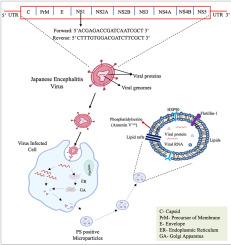Macrophage-derived microparticles facilitate the dissemination and spread of Japanese encephalitis virus and offer targets for antiviral intervention
IF 3.5
3区 生物学
Q3 CELL BIOLOGY
引用次数: 0
Abstract
Japanese encephalitis virus (JEV) is thought to spread systemically; however, its transport and propagation mechanisms remain unclear. This study examined JEV progression through analysis of macrophage response and macrophage-derived microparticles (MPs) dynamics. MPs were isolated from conditioned media of macrophages at 72 h post-infection to assess their role in JEV transmission. Flow cytometry, qRT-PCR and western blotting were performed to analyze the MPs' JEV content and protein profiles. To further determine the impact of MPs on viral spread, MPs were neutralized and cocultured with uninfected macrophages. JEV infection was also mapped in the brain and lymph nodes at 24 h and 7 days post-infection to investigate early viral movement via macrophage-derived MPs. The findings indicate macrophage-derived MPs facilitate JEV transit from the brain to the lymph nodes. JEV infection of macrophages triggers apoptosis, increased viral replication, and a proinflammatory response, leading to the heightened secretion of MPs. These MPs carried JEV RNA, cytokines, and proteins such as HSP90 and flotillin-1. MPs from infected macrophages promoted viral spread to uninfected macrophages, initiating viremia. Neutralizing MPs with annexin V antibodies or heat inactivation significantly reduced JEV RNA levels in cocultures. These results suggest macrophage-derived MPs play a key role in JEV dissemination and presenting potential targets for antiviral intervention.

巨噬细胞衍生的微粒促进日本脑炎病毒的传播和传播,并为抗病毒干预提供靶点。
日本脑炎病毒(JEV)被认为是系统性传播;然而,其转运和传播机制尚不清楚。本研究通过分析巨噬细胞反应和巨噬细胞衍生微粒(MPs)动力学来检测乙脑病毒的进展。在感染后72小时从巨噬细胞条件培养基中分离MPs,以评估它们在乙脑病毒传播中的作用。用流式细胞术和western blotting分析MPs的JEV含量和蛋白谱。为了进一步确定MPs对病毒传播的影响,将MPs中和并与未感染的巨噬细胞共培养。在感染后24小时和7天,脑和淋巴结也绘制了乙脑病毒感染图,以研究病毒通过巨噬细胞来源的MPs的早期运动。研究结果表明巨噬细胞来源的MPs促进乙脑病毒从脑转移到淋巴结。JEV感染巨噬细胞引发细胞凋亡、病毒复制增加和促炎反应,导致MPs分泌增加。这些MPs携带乙脑病毒RNA、细胞因子和HSP90和flotilin -1等蛋白。来自感染巨噬细胞的MPs促进病毒向未感染的巨噬细胞扩散,引发病毒血症。用膜联蛋白V抗体中和MPs或热失活可显著降低共培养中乙脑病毒RNA水平。这些结果表明巨噬细胞来源的MPs在乙脑病毒传播中起关键作用,并提供抗病毒干预的潜在靶点。
本文章由计算机程序翻译,如有差异,请以英文原文为准。
求助全文
约1分钟内获得全文
求助全文
来源期刊

Experimental cell research
医学-细胞生物学
CiteScore
7.20
自引率
0.00%
发文量
295
审稿时长
30 days
期刊介绍:
Our scope includes but is not limited to areas such as: Chromosome biology; Chromatin and epigenetics; DNA repair; Gene regulation; Nuclear import-export; RNA processing; Non-coding RNAs; Organelle biology; The cytoskeleton; Intracellular trafficking; Cell-cell and cell-matrix interactions; Cell motility and migration; Cell proliferation; Cellular differentiation; Signal transduction; Programmed cell death.
 求助内容:
求助内容: 应助结果提醒方式:
应助结果提醒方式:


